全国 2012 年 4 月高等教育自学考试综合英语(二)真题
课程代码:00795
请将答案填在答题纸相应位置上
I.语法、词汇。从 A、B、C、D 四个选项中,选择一个正确答案,并填在答题纸相应的位置
上。错选、多选或未选均无分。(本大题共 15 小题,每小题 1 分,共 15 分)
1. The man in the store won’t change money for him ______ he buys something.
A. if
C. but
B. or
D. unless
2. The old harbor is still full of pleasant atmosphere and well worth ______.
A. visit
C. to be visited
B. to visit
D. visiting
3. The car often breaks down and we must have it ______ thoroughly.
A. check
C. to check
B. checked
D. checking
4. If she ______ here last night, I would have told her the good news.
A. came
C. would come
B. had come
D. was coming
5. Can you tell me ______ about this city that makes people love it so much?
A. it is what
C. what is it
B. what it is
D. is it what
6. By the time you get to the shopping mall, the stores ______.
A. have been closed
B. are to be closed
C. will have been closed
D. are being closed
�
7. ______ , our next step is to determine how to carry it out.
A. Having made the plan
B. Making the plan
C. The plan is being made
D. The plan having been made
8. Some English words can have different meanings depending on the ______ in which
they are used.
A. context
C. content
B. contact
D. contrast
9. It ______ artificial, but at that price what can you expect?
A. eats
C. chews
B. flavors
D. tastes
10. I ______ hope that these very unfortunate people will not be forgotten.
A. sincerely
B. seriously
C. honestly
11. We had to ______ a lot of noise when the children were at home.
D. frankly
A. come up with
C. put up with
B. catch up with
D. keep up with
12. When I was eighteen I was independent ______ my parents.
A. on
C. to
B. of
D. with
13. The water was so clear that it ______ the trees on the river bank.
A. shadowed
C. reflected
B. presented
D. shaded
14. In this advanced course students must take objective tests at monthly ______.
�
A. length
C. intervals
B. period
D. gaps
15. The ______ majority of people do not actually attend sports events, but see them
through the eyes of the media.
A. main
B. wide
C. big
II.完形填空。从 A、B、C、D 四个选项中,选择一个正确答案,并填在答题纸相应的位置
上。错选、多选或未选均无分。(本大题共 15 小题,每小题 1 分,共 15 分)
D. vast
Bridge is a structure used by people and vehicles to cross areas that are obstacles
to travel. Without bridges, people would need
to cross waterways and would
have to travel around such obstacles
canyons and valleys.
17
16
18
Bridges range
bridge must be strong enough to support its own weight
people and vehicles that use it. It must also
earthquakes, strong winds, and changes in temperature.
from a few feet or meters to several miles or kilometers. A
the weight of the
natural occurrences, including
19
20
of the bridge are called abutments (桥墩), and the supports that
Most bridges are held up by at least two supports set in the ground. The
21
between two adjacent supports is called a span of a bridge. The supports at each
22
between
the two abutments are called piers. Most short bridges are supported only by
abutments and are known as
-span bridges. Bridges that have one or more piers
25
the abutments are called multi-span bridges. Most long bridges are multi-span
bridges. The main span is the longest span of a multi-span bridge.
23
24
26
type of bridge because of
Suspension bridges (吊桥) are perhaps the most
. These bridges have a roadway
their long main span and especially attractive
that hangs from steel cables that are supported by two high towers. Suspension
great distances. They are also used to cross deep water
bridges are used to
or steep canyons, and in other places
the construction of piers is especially
difficult and
. These bridges require only two piers, each of which supports
a tower.
27
29
28
30
16. A. buses
D. boats
17. A. like
D. to
B. planes
C. trains
B. as
C. with
�
18. A. in height
D. in width
19. A. as well as
D. according to
20. A. prevent
D. fight
21. A. space
D. stretch
22. A. end
D. part
23. A. run
D. stand
24. A. sole
D. simple
B. in depth
C. in length
B. by means of
C. except for
B. resist
C. beat
B. extent
C. distance
B. side
C. way
B. remain
C. stay
B. unique
C. single
25. A. in proportion to
D. in front of
B. in addition to
C. in place of
26. A. impressive
D. constructive
27. A. existence
D. ability
28. A. measure
D. span
29. A. while
D. which
B. expressive
C. productive
B. appearance
C. quality
B. move
C. extend
B. when
C. where
30. A. profitable
D. expensive
III.难句释义。从 A、B、C、D 四个选项中,选择一个正确答案,并填在答题纸相应的位置
上。错选、多选或未选均无分。(本大题共 10 小题,每小题 1 分,共 10 分)
B. practical
C. necessary
31. Many apparently naive inquiries like why grass is green, or why the Sun is round,
or why we need 55,000 nuclear weapons in the world—are really deep questions. The
�
answers can be a gateway to real insights.
A. ...The answers are accurate in meaning.
B. …The answers can lead us to new findings.
C. …The answers are the key to great human achievements.
D. …The answers can help us get a deep understanding of things.
32. Yet, some people say that ours is an age where true heroes and heroines are hard
to come by, where the very ideal of heroism is something beyond us—an artifact of
the past.
A. …extraordinary heroes are rare...
B. …we can never become as good as heroes...
C. …heroism is a complex concept and hard to grasp...
D. …the underlying meaning of heroism is hard to understand...
33. “An artist’s heart is his head,” replied Trevor; “and besides, our business
is to show the world as we see it, not to make it better.”
A. …the artist’s duty is to reflect the reality, not to improve it.
B. …the artist’s job is to make drawings of the earth instead of other planets.
C. …the artist’s business is to paint anything real, not to use his imagination.
D. ...the artist’s responsibility is to create images rather than reflecting the
reality.
34. It [getting my Berlin diaries out] was risky, but life in the Third Reich had
always been risky. It was worth a try.
A. I would try it, although it was very dangerous, just like life in the Third Reich.
B. I would try it, although it might make my life in the Third Reich more dangerous.
C. No matter how dangerous life in the Third Reich was, I would get my Berlin diaries
out.
�
D. The dangerous life in the Third Reich would be unforgettable if I could get my
Berlin diaries out.
35. These hands spoke of the stubbornness of mankind.
A. These hands referred to the hard work and power of mankind.
B. These hands demonstrated the wisdom and diligence of mankind.
C. These hands represented the rigidness and inflexibility of mankind.
D. These hands showed the perseverance and determination of mankind.
36. Even when you have doubts about some people, act as if they are worthy of your
best manners.
A. Although some people are rude to you, you should still be polite to them.
B. Even when you suspect some people, behave courteously as if you like them.
C. Even when you are not sure whether some people deserve your politeness, treat
them as if they do.
D. Although you don’t trust some people, you should show your politeness to them
as if they are trustworthy.
37. We won’t have to do any entertaining—the liquor bills alone are always
staggering at Christmas.
A. …the amount of money spent on liquor is fixed at Christmas.
B. …we have to pay a lot of money just for liquor at Christmas.
C. …we are only surprised at the liquor bills at Christmas.
D. …the price of liquor is very high at Christmas.
38. His reaction indicates to me that I actually stand a chance of coming up with
a workable design [of a bomb].
A. …a bomb will be produced according to my design.
B. …designing a bomb will give me a chance of working.
C. …I have a chance of working on a bomb to be exploded.
�
D. …it is possible for me to design a bomb that can be exploded.
39. I was blessed with a rare determination to make something of myself.
A. …I had a strong determination to begin a new life.
B. …I had a great confidence in myself to become rich.
C. …fortunately I was exceptionally determined to succeed.
D. …naturally I was extremely confident to rely on nobody but myself.
40. It was a hard, stubborn land; but people in those difficult places do not forget
the law of hospitality to the stranger—for their God may decree that they too shall
become strangers on the face of the earth.
A. Though their conditions were difficult to change, people of those places tried
to show their kindness to strangers...
B. Though the people in those places were as stubborn as their land, they were
hospitable to strangers...
C. The land was difficult to farm, but people there never failed to be kind and
friendly to strangers...
D. It was very unusual for people in those poor places to treat strangers so warmly...
IV.阅读理解。阅读短文,根据短文的内容从 A、B、C、D 四个选项中,选择一个正确答案,
并填在答题纸相应的位置上。错选、多选或未选均无分。(本大题共 10 小题,每小题 2 分,
共 20 分)
Passage One
My grandmother was an iron-willed woman, the feared matriarch (女首领) of our New
York family back in the 1950s.
When I was five years old, she invited some friends and relatives to her Bronx
apartment for a party. Among the guests was a neighborhood big shot who was doing
well in business. His wife was proud of their social status and let everyone at the
party know it. They had a little girl about my age who was spoiled and very much
used to getting her own way.
Grandmother spent a lot of time with the big shot and his family. She considered
them the most important members of her social circle and worked hard at currying
�
their favor.
At one point during the party, I made my way to the bathroom and closed the door
behind me. A minute or two later, the little girl opened the bathroom door and grandly
walked in. I was still sitting down.
“Don’t you know that little girls aren’t supposed to come into the bathroom when
a little boy is using it!?” I shouted loudly.
The surprise of my being there, along with the indignation I had heaped upon her,
stunned the little girl. Then she started to cry. She quickly closed the door, ran
to the kitchen, and tearfully complained to her parents and my grandmother.
Most of the partygoers had overheard my loud remark and were greatly amused by it.
But not Grandmother.
She was waiting for me when I left the bathroom. I received the longest, sharpest
tongue-lashing of my young life. Grandmother yelled that I was impolite and rude
and that I had insulted that nice little girl. The guests watched and drew back in
absolute silence. So forceful was my grandmother’s personality that no one dared
stand up for me.
After her scolding speech was over and I had been dismissed, the party continued,
but the atmosphere was much tenser.
Twenty minutes later, all that changed. Grandmother walked by the bathroom and
noticed a stream of water flowing out from under the door.
She shrieked twice—first in astonishment, then in rage. She flung open the bathroom
door and saw that the sink and tub were plugged up and that the faucets (水龙头)
were going at full blast.
Everyone knew who the criminal was. The guests quickly formed a protective barricade
around me, but Grandmother was so furious that she almost got to me anyway, waving
her arms as if trying to swim over the crowd.
Several strong men eventually moved her away and calmed her down, although she was
still hot with anger for quite a while.
My grandfather took me by the hand and sat me on his lap in a chair near the window.
He was a kind and gentle man, full of wisdom and patience. Rarely did he raise his
voice to anyone, and never did he argue with his wife or resist her wishes.
He looked at me with much curiosity, not at all angry or upset. “Tell me,” he asked,
�
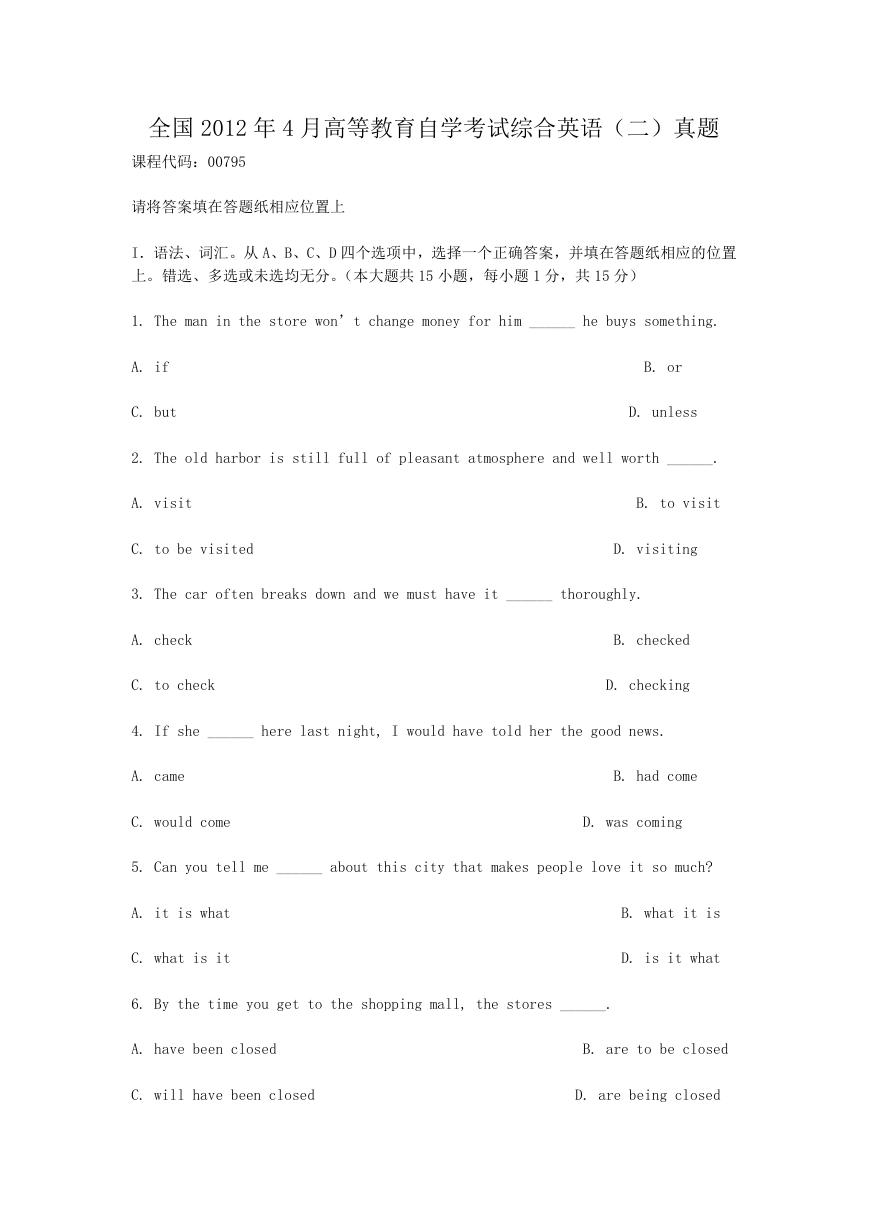
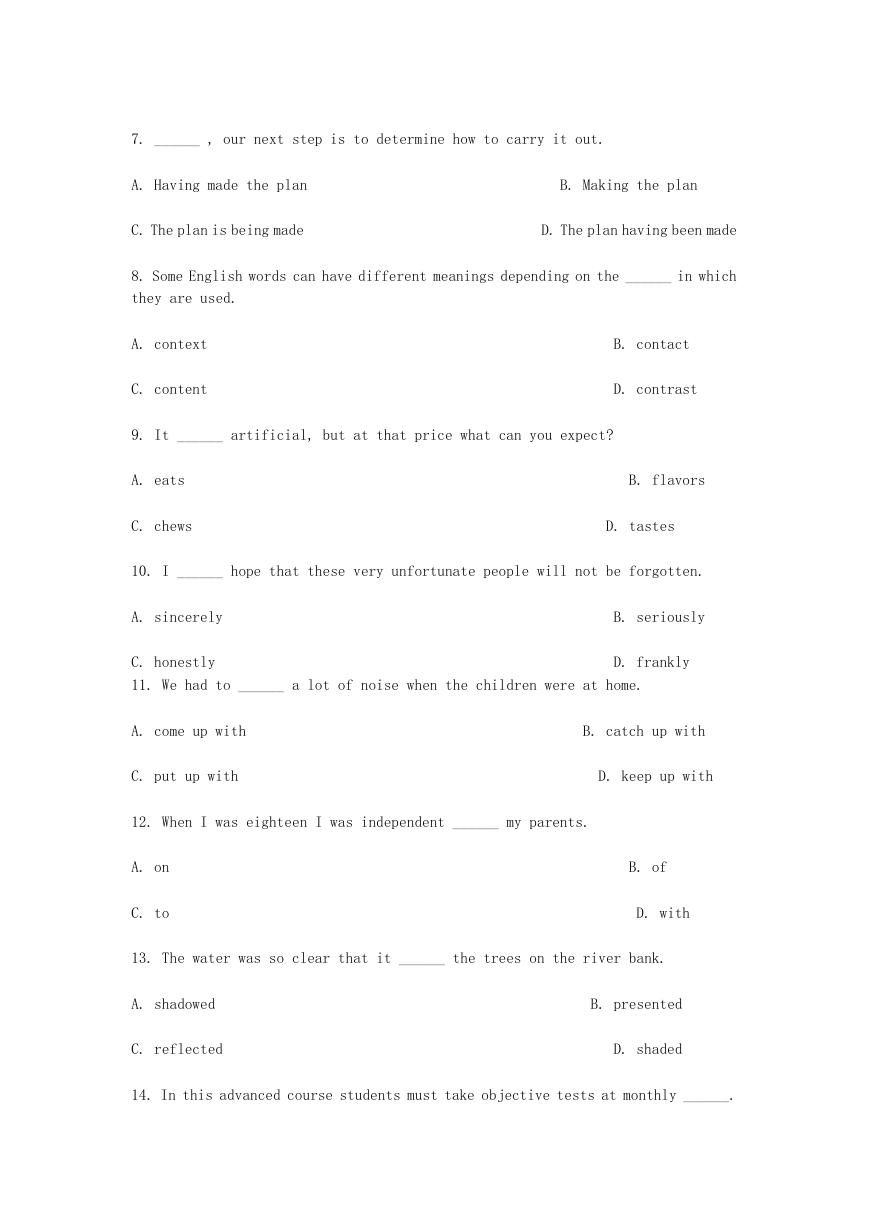
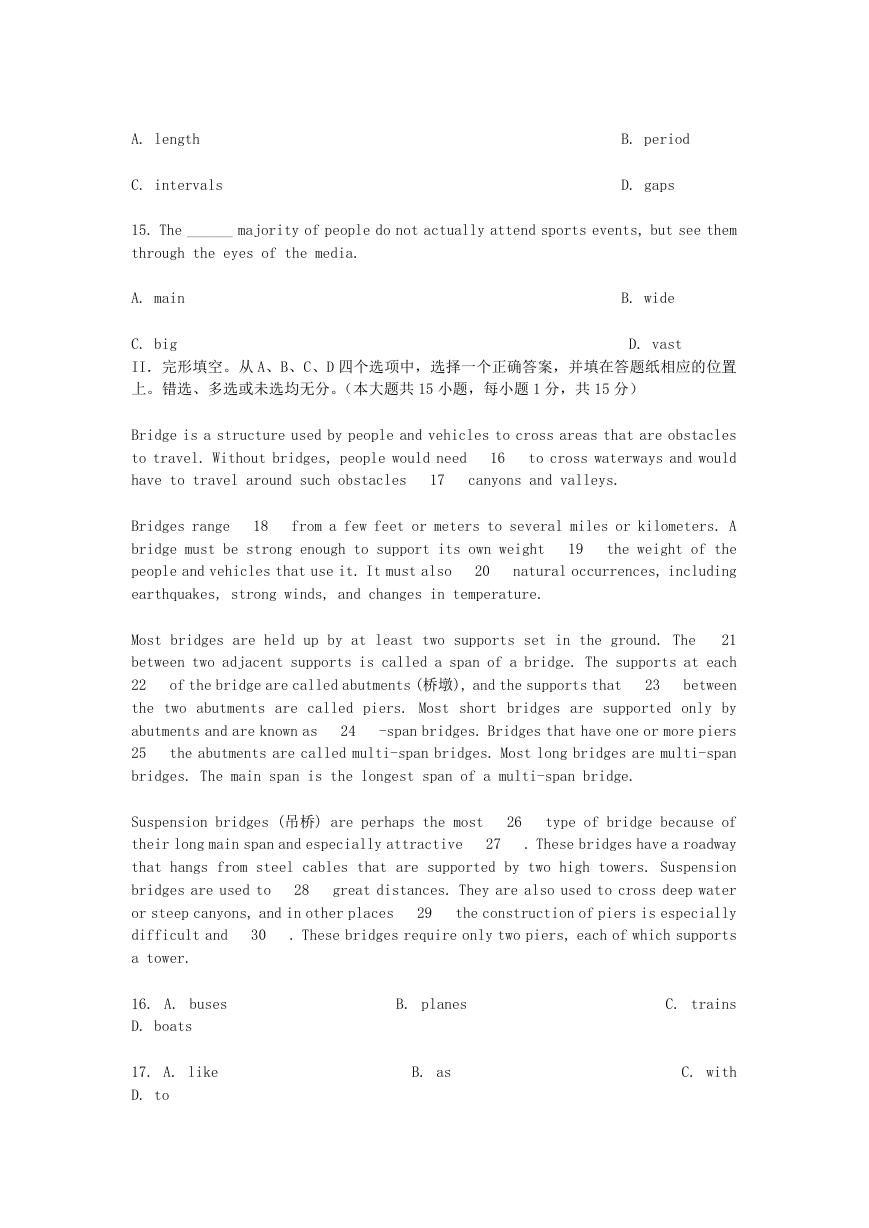
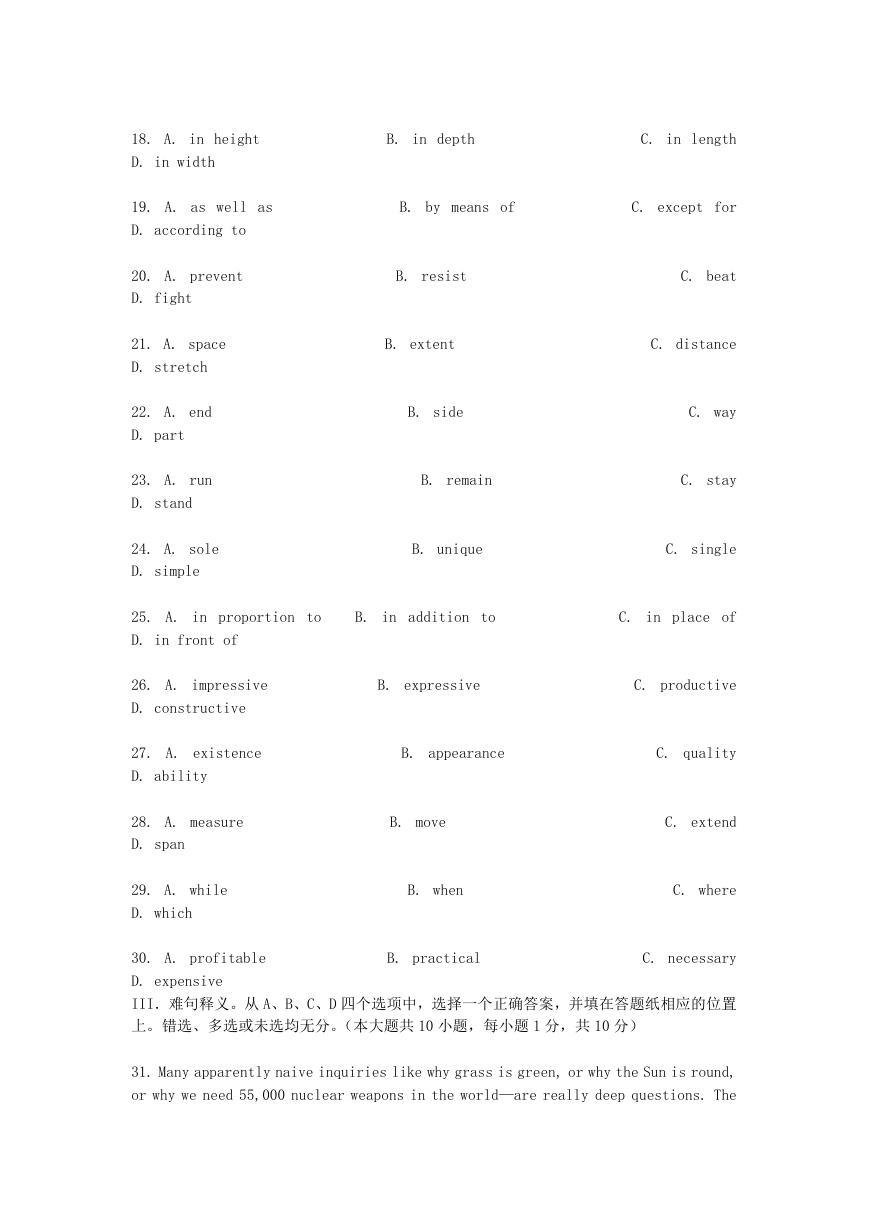
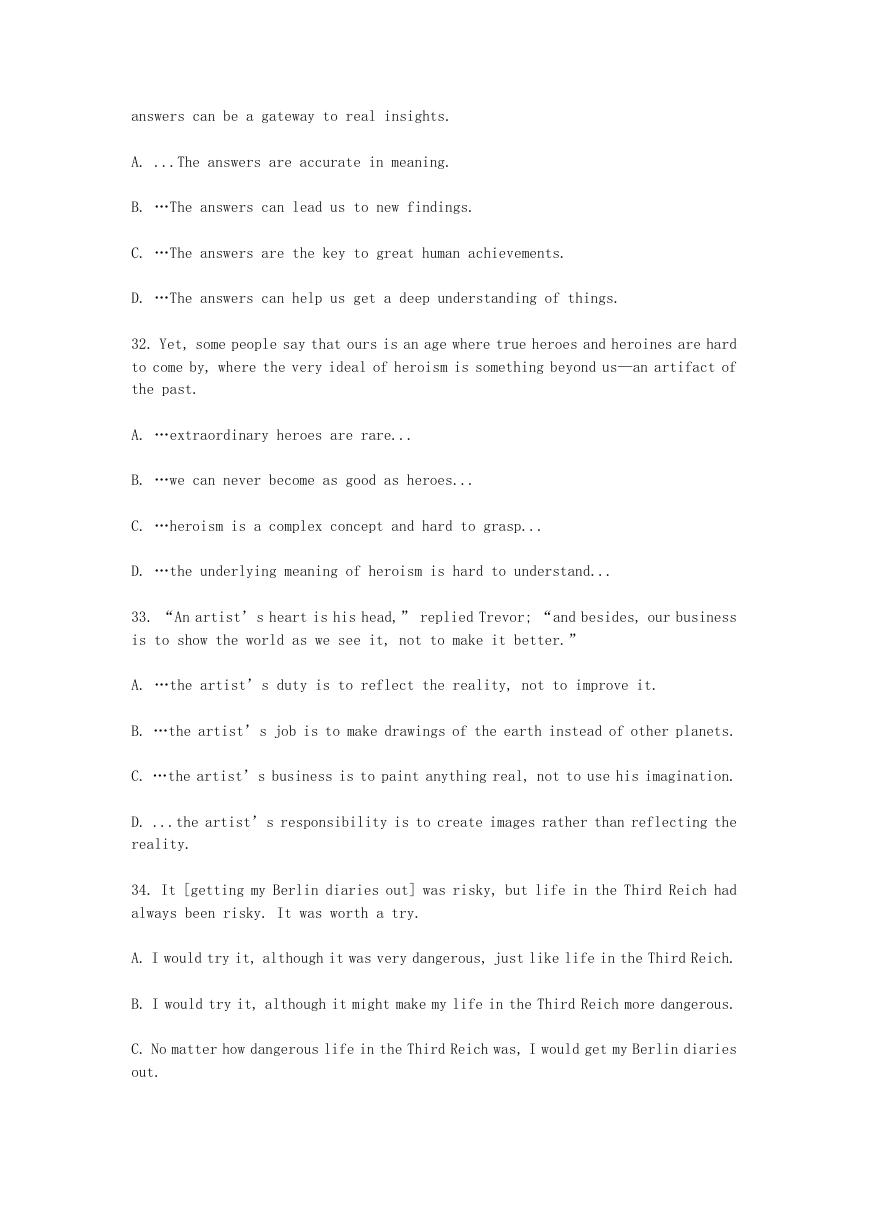
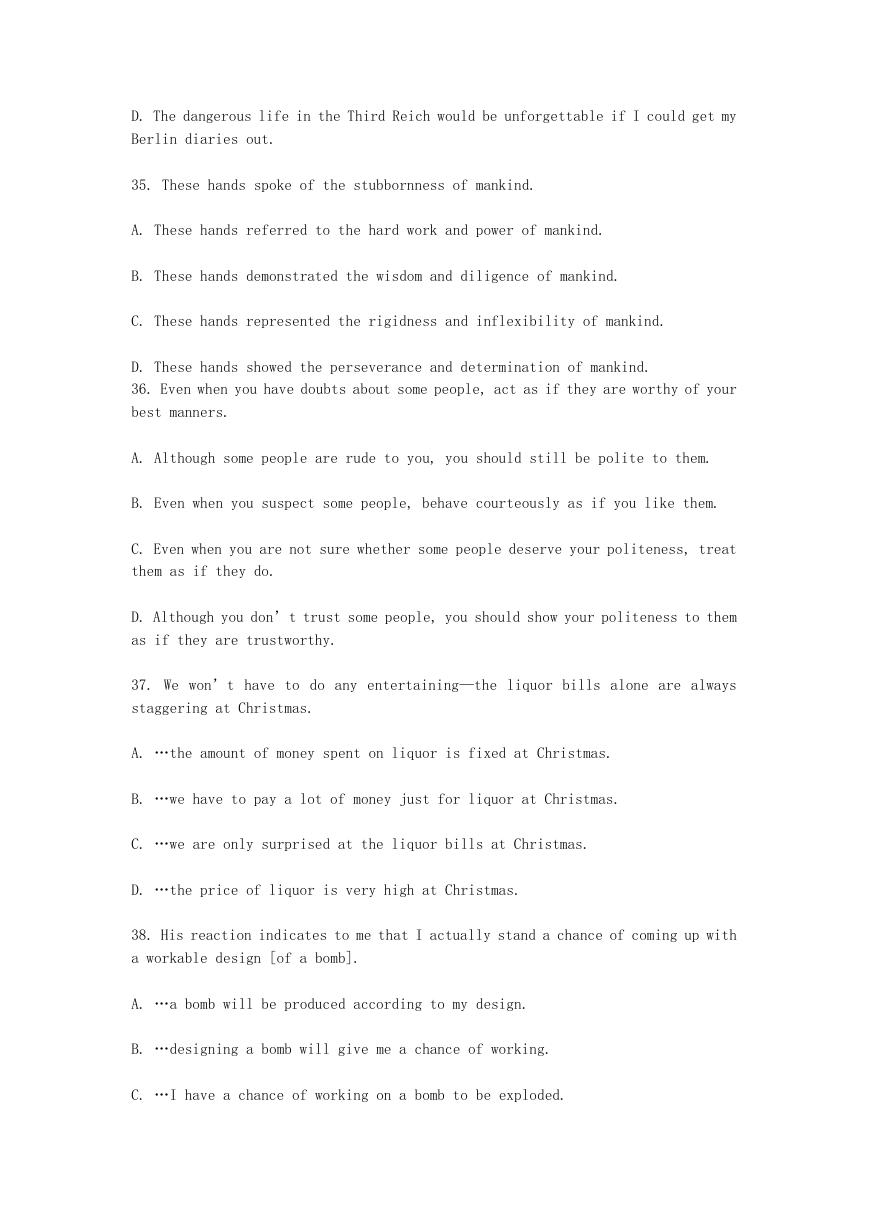
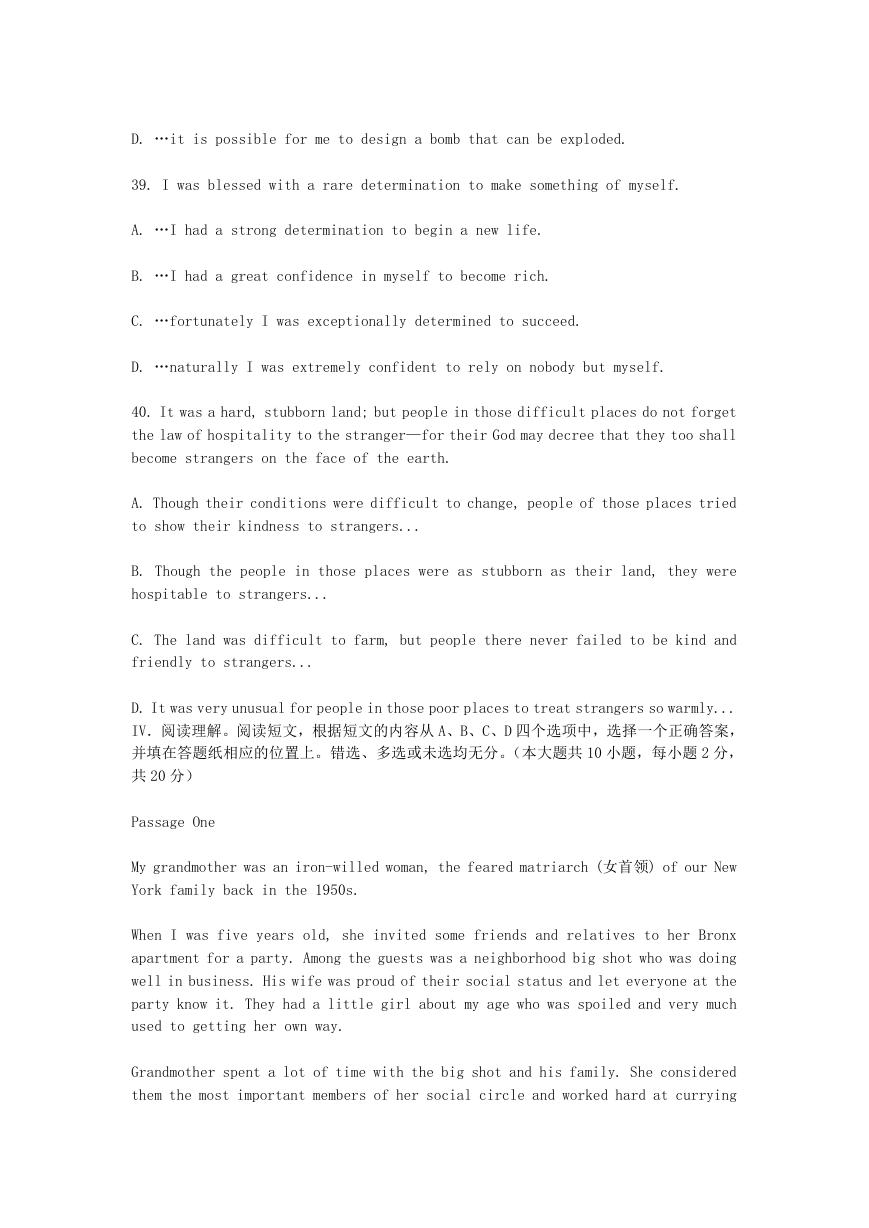
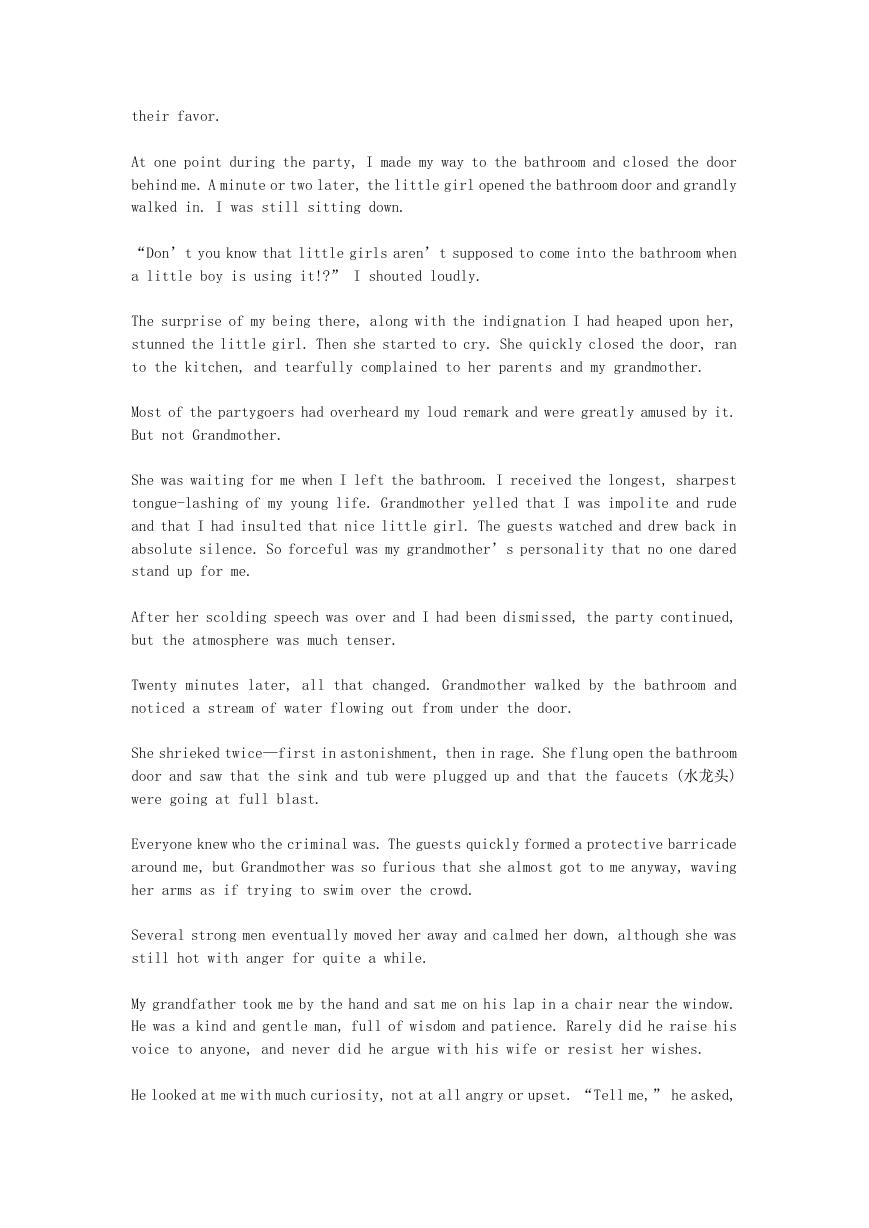








 2023年江西萍乡中考道德与法治真题及答案.doc
2023年江西萍乡中考道德与法治真题及答案.doc 2012年重庆南川中考生物真题及答案.doc
2012年重庆南川中考生物真题及答案.doc 2013年江西师范大学地理学综合及文艺理论基础考研真题.doc
2013年江西师范大学地理学综合及文艺理论基础考研真题.doc 2020年四川甘孜小升初语文真题及答案I卷.doc
2020年四川甘孜小升初语文真题及答案I卷.doc 2020年注册岩土工程师专业基础考试真题及答案.doc
2020年注册岩土工程师专业基础考试真题及答案.doc 2023-2024学年福建省厦门市九年级上学期数学月考试题及答案.doc
2023-2024学年福建省厦门市九年级上学期数学月考试题及答案.doc 2021-2022学年辽宁省沈阳市大东区九年级上学期语文期末试题及答案.doc
2021-2022学年辽宁省沈阳市大东区九年级上学期语文期末试题及答案.doc 2022-2023学年北京东城区初三第一学期物理期末试卷及答案.doc
2022-2023学年北京东城区初三第一学期物理期末试卷及答案.doc 2018上半年江西教师资格初中地理学科知识与教学能力真题及答案.doc
2018上半年江西教师资格初中地理学科知识与教学能力真题及答案.doc 2012年河北国家公务员申论考试真题及答案-省级.doc
2012年河北国家公务员申论考试真题及答案-省级.doc 2020-2021学年江苏省扬州市江都区邵樊片九年级上学期数学第一次质量检测试题及答案.doc
2020-2021学年江苏省扬州市江都区邵樊片九年级上学期数学第一次质量检测试题及答案.doc 2022下半年黑龙江教师资格证中学综合素质真题及答案.doc
2022下半年黑龙江教师资格证中学综合素质真题及答案.doc